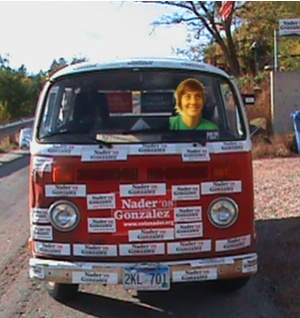From the Road

For the last three weeks, I have been traveling around the country talking to college students about Ralph Nader and the state of our democracy.
As far as I can tell, there are two main camps of college students: the disillusioned and the illusioned. The disillusioned students have had too much of George W. Bush to try anymore. They know how bad things are and they listen to Nader’s solutions patiently, but in the end they want me to risk-proof reform, show them that it is inevitable and will require nothing from them. If not, they are not interested. Their classic cop-out is a compliment: "I admire your idealism. We need more people like you.”
I tell them I don’t want their admiration. I want their effort. I agree that we need more idealists, and that they could start by adding their names to the list. These disillusioned students are responsible for their self-fulfilling prophecies; they are sure nothing will change and—surprise—nothing does. They take comfort in the fact that a cynic is always right.
The second group of students is illusioned. At first this sounds better than the alternative, but in fact it is much more dangerous. These students have seen eight years of Bush, concluded something was wrong, and decided Barack Obama was the solution to all ills. They have not experienced a ‘hope and change’ campaign before, and they don’t want to know how those words panned out in previous elections. They are the victims of branding campaigns that have co-opted their powerful idealism, cored out the substance, and replaced it with aesthetic rebellion.
Ironically, it was at the most liberal campuses—places like Eugene, Oregon—where I had the hardest time getting a crowd. On the streets, kids were busy modeling the appropriate hippie chic, but the spirit of the sixties had gone underground. The whole thing recalls how corporations marketed the punk image to pad the bank accounts of the very establishments punk had been fighting. In the end, punk was largely assimilated by an industry that used the anger aesthetic as a front for more of the same.
The Obama campaign has waged another bloodless brand revolution, getting college students to happily give up their real power in exchange for the image of it. College campuses, for all our accolades, are not nearly the bastions of progressivism for which we give them credit. Instead, they are largely haunted by the illusioned, who do their own part in creating the reality they are criticizing.
Luckily, there is a third camp of college students. These are the realist-idealists. They are realists because they understand the gravity of the situation: they know that America failed us before Bush and that it will fail us again unless we reclaim it. They know that the reality of human suffering is not changed by pretty words and slick strategies. And they know that it is much more realistic to fight for what they want than to accept something they don’t—that a hope not based in fact is not hope but complacency.
They are idealists because they haven’t been convinced that the personal is not the political. They believe that the ethics governing their personal interactions should be the ethics governing our public interactions. They are idealists because they understand how hard they will have to work and how much they will have to risk to get their country back. But mostly they are idealists because they don’t just want the politics of justice and restraint. They want the politics of mercy and joy. They do not accept the technocratic dialogue of bureaucracy. They want the rhetorical revolution of a robust democracy, where we talk about why things really happened and how we might have been responsible. They are idealists because they are sick of an American myth that allows for violence, hubris, and hypocrisy. They are realists because they want the American real.
These students are familiar with Decoy Democracy. They know that press has been traded for publicity, that politics has been replaced by punditry, and that the media is in the business of reality creation instead of news reporting. They know that voting and debates don’t make a democracy. They know when politicians use piecemeal reforms to distract them from politics as usual, and they know that solidarity with an invented demographic is not as important as solidarity with workers, reformers, and the poor.
I know because we’ve talked about all these things, and I know it because these students are rising up. They will be here after the election, and the one after, and the one after, howling in the streets. So enough of illusions and disillusions, branding and myths. Here’s to realist-idealists for the American real.
Onward!
Ashley Sanders
The Nader Team



